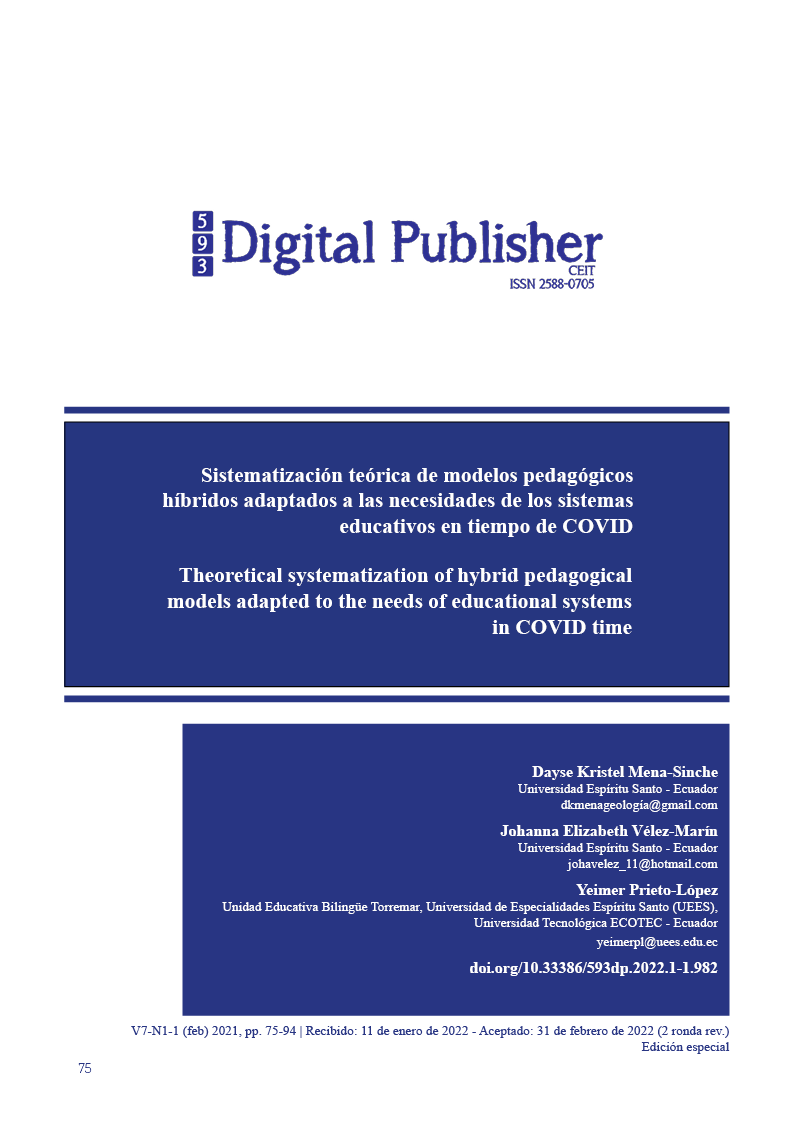Theoretical systematization of hybrid pedagogical models adapted to the needs of educational systems in COVID time.
Main Article Content
Abstract
The pandemic related with the COVID-19 has considerably affected the educational system, forcing the total or partial closure of schools around the world. Until now, it has not been possible the reestablishment of the face-to-face modality. Consequently, this situation requires innovate the traditional way in which education has been conceived and tackling new models or concepts that respond to these needs. The article’s purpose is to develop a proposal for a hybrid pedagogical model, as an alternative to the requirements of the Ecuadorian educational system in times of COVID; For this, an investigation was designed with an exploratory, descriptive, and analytical qualitative approach. It were used methods of the theoretical and empirical level. In reference to the first one, the historical-logical, analysis-synthesis and induction-deduction methods were applied to organize and structure this document; on the other hand, the empirical methods used were: scientific observation, interviews and surveys whose purpose were to obtain relevant information for the model’s construction. It was concluded that hybrid education models are a highly efficient alternative to face adverse situations which put the continuity of the educational process at risk. Furthermore, this model meets the requirements of education such as flexibility, equity, inclusion, and interaction of students. However, for its successful implementation it is necessary to overcome barriers in reference to the economic, technological, and attitudinal factor.
Downloads
Article Details

This work is licensed under a Creative Commons Attribution-NonCommercial-ShareAlike 4.0 International License.
1. Derechos de autor
Las obras que se publican en 593 Digital Publisher CEIT están sujetas a los siguientes términos:
1.1. 593 Digital Publisher CEIT, conserva los derechos patrimoniales (copyright) de las obras publicadas, favorece y permite la reutilización de las mismas bajo la licencia Licencia Creative Commons 4.0 de Reconocimiento-NoComercial-CompartirIgual 4.0, por lo cual se pueden copiar, usar, difundir, transmitir y exponer públicamente, siempre que:
1.1.a. Se cite la autoría y fuente original de su publicación (revista, editorial, URL).
1.1.b. No se usen para fines comerciales u onerosos.
1.1.c. Se mencione la existencia y especificaciones de esta licencia de uso.
References
Aguilar, E., Buil, L., Sánchez, V. & Valera, M., (2021). Aplicación de un proyecto semipresencial de clase invertida en el Grado en Educación Primaria. https://repositorio.grial.eu/bitstream/grial/2429/1/Aguilar.pdf
Alvarado, M., Rosario, V., & Robles, L. (2020). La pandemia de la COVID-19 como oportunidad para repensar la educación superior en México. México: Amaya Ediciones. http://www.cucea.udg.mx/include/publicaciones/coorinv/pdf/.dig-educacion-COVID.pdf
Barker, J. (2015). Benefits of hybrid classes in community colleges. https://academicworks.cuny.edu/bm_pubs/110/
Barragán, A., Ávila, C., Belmonte, A., Camarena, M., & Gómez, R. (2021). Ambientes híbridos de aprendizaje en estudios de posgrado. Revista Iberoamericana de Tecnología En Educación y Educación En Tecnología, 28, 149–156. https://doi.org/10.24215/18509959.28.e18
Bonilla, J. (2020). Las dos caras de la educación en el COVID-19. Ciencia América. http://cienciamerica.uti.edu.ec/openjournal/index.php/uti/article/view/294/461
Cai, J., Yang, H. H., Gong, D., MacLeod, J., & Jin, Y. (2018). A case study to promote computational thinking: The lab rotation approach. In International Conference on Blended Learning (pp. 393-403). Springer, Cham. https://doi.org/10.1007/978-3-319-94505-7_32
Christensen, C. M., Horn, M. B., & Staker, H. (2013). Is K-12 Blended Learning Disruptive? An Introduction to the Theory of Hybrids. Clayton Christensen Institute for Disruptive Innovation. https://eric.ed.gov/?id=ed566878
Instituto Nacional de Evaluación Educativa (INEVAL). (2014). Resolución No 080-INEVAL-2014. https://www.evaluacion.gob.ec/wp-content/uploads/downloads/2015/06/AnexoB.resolucion080-Ineval-2014.pdf
Fredin, E. (2017). Aprendizaje híbrido: ¿el futuro de la educación superior? Obtenido de Tecnológico de Monterrey. https://observatorio.tec.mx/edu-news/2017/10/13/aprendizaje-hibrido-el-futuro-de-la-educacion-superior
Fullan, M., Quinn, J., Drummy, M., Gardner, M. (2020), “Education Reimagined; The Future of Learning”. A collaborative position paper between NewPedagogies for Deep Learning and Microsoft Education. http://aka.ms/ HybridLearningPaper
García, L. (2021). COVID-19 y educación a distancia digital: preconfinamiento, confinamiento y posconfinamiento. RIED. Revista Iberoamericana de Educación a Distancia , 09-32. https://www.redalyc.org/jatsRepo/3314/331464460001/331464460001.pdf
Higuera, É. & Castillo, N., (2015). La interculturalidad como desafío para la educación ecuatoriana. https://www.redalyc.org/pdf/4418/441846095009.pdf
Lei, S. A., & Gupta, R. K. (2010). College distance education courses: evaluating benefits and costs from institutional, faculty and students'perspectives. Education, 130(4). https://www.semanticscholar.org/paper/College-Distance-Education-Courses%3A-Evaluating-and-Lei-
Linder, K. (2017). Fundamentals of hybrid teaching and learning. New Directions for Teaching and Learning, 119, 1–7. https://doi.org/https://doi.org/10.1002/tl.20222
Lugo, M., Loiácono, F., Achard, I., Area, M., Odetti, Valeria, Baberis, M., Bongiovanni, P., Rogovsky, C., García, J., & Zapata, M. (2020). Las tecnologías en (y para) la Educación. FLACSO Editorial. https://www.flacso.edu.uy/publicaciones/edutic2020/garcia_garcia_tecnologias_en_y_para_la_educacion.pdf
Mahalli, J. N., Mujiyanto, J., & Yuliasri, I. (2019). The Implementation of Station Rotation and Flipped Classroom Models of Blended Learning in EFL Learning. English Language Teaching, 12(12), 23-29. https://pdfs.semanticscholar.org/dc9f/dac505012ec34367676740e21392441a5196.pdf
Mepal. (2021). Mepal. Recuperado el Agosto de 2021, de Mepal: https://mepal.ec/content/180-el-modelo-hibrido-en-la-educacion
Ministerio de Educación., (2020). “Juntos aprendemos y nos cuidamos” - Plan de continuidad educativa, permanencia escolar y uso progresivo de las instalaciones educativas. https://educacion.gob.ec/wp-content/uploads/downloads/2020/08/Guia-para-la-alternancia-entre-la-educacion-casa-y-la-educacion-en-la-escuela.pdf
Ministerio de Educación., (2021). Transformaciones Educativas en Ecuador. https://educacion.gob.ec/wp-content/uploads/downloads/2021/05/Transformaciones-educativas-en-Ecuador.pdf
Ministerio de Educación. (2021). Lineamiento para el retorno seguro a clases presenciales. Volvemos al Aforo Completo de forma planificada y por niveles. https://educacion.gob.ec/wp-content/uploads/downloads/2021/11/LINEAMIENTO-PARA-RETORNO-SEGURO-A-CLASES-PRESENCIALES-2021.pdf
Obesso, M., & Nuñez, M. (2021). El modelo educativo híbrido: una respuesta necesaria de la enseñanza universitaria a partir de la COVID-19. Colección Comunica, January. https://doi.org/10.13140/RG.2.2.34706.89289
Pallarès, M., Chiva, Ó., Planella, J., & López Martín, R. (2018). Repensando la educación. Trayectoria y futuro de los sistemas educativos modernos. Perfiles educativos, 41(163), 143-157. http://www.scielo.org.mx/pdf/peredu/v41n163/0185-2698-peredu-41-163-143.pdf
Perkins, B. Ganancia del aprendizaje en cursos Presenciales, Híbridos y Flexibles Interactivos y con Tecnología (FIT) https://www.researchgate.net/profile/Blanca-Bazan-Perkins/publication/338197777_Learning_gain_in_Classroom_Blended_and_Flexible_Interactive_and_with_Technology_FIT_courses/links/5e0677784585159aa49f7fac/Learning-gain-in-Classroom-Blended-and-Flexible-Interactive-and-with-Technology-FIT-courses.pdf
Rama, C. (2021). La nueva educación híbrida. México: D.R. Unión de Universidades de América Latina y el Caribe, A.C. https://www.udual.org/principal/wp-content/uploads/2021/03/educacion_hibrida_isbn_interactivo.pdf
Rieble-Aubourg, S., & Viteri, A. (2020). Hablemos de Política Educativa Ameríca Latina y el Caribe - Educación más allá del COVID-19. 1 Política Educativa Hablemos de América Latina y El Caribe, 0(0), 1–20. https://publications.iadb.org/publications/spanish/document/Hablemos-de-politica-educativa-en-America-Latina-y-el-Caribe-1-Educacion-mas-alla-del-COVID-19.pdf
Ríos, Y. (2021). La enseñanza post pandemia: retos y tendencias de la educación híbrida. Plus Economía, 9, 107–112. http://revistas.unachi.ac.pa/index.php/pluseconomia/article/view/504/436
Rivas A, André F y Delgado L. Cincuenta innovaciones educativas para escuelas. Buenos Aires. CIPPEC y Santillana, 2017. https://fundacionsantillana.com/wp-content/uploads/2020/04/CIPPEC-50-Innovaciones-educativas.pdf
Sanabria, I. (2020). Educación virtual: oportunidad para “aprender a aprender”. Análisis Carolina, (42), 1. https://www.fundacioncarolina.es/wp-content/uploads/2020/07/AC-42.-2020.pdf
Salinas, J., de Benito Crosetti, B., Garcías, A., & Gisbert, M. (2018). Blended learning, más allá de la clase presencial. RIED. Revista Iberoamericana de Educación a Distancia, 21(1), 195-213. https://www.redalyc.org/journal/3314/331455825011/html/
Shamad, A., & Suardi, W. (2019). Lecturers' participation in applying blended learning in Islamic higher education in Indonesia. Universal Journal of Educational Research, 7(12), 2604-2608. http://repo.iain-padangsidimpuan.ac.id/445/1/UJER7-19513811.pdf
Sistema de Información de Tendencias Educativas en América Latina (SITEAL). (2019). Ecuador: Perfil país https://siteal.iiep.unesco.org/sites/default/files/sit_informe_pdfs/dpe_ecuador-_25_09_19.pdf
Suárez, R. (2018). Reflexiones sobre el concepto de innovación. Revista San Gregorio, (24), 120-131. https://dialnet.unirioja.es/servlet/articulo?codigo=6839735
Torres Chávez, T. E., & García Martínez, A. (2019). Reflexiones sobre los materiales didácticos virtuales adaptativos. Revista Cubana de Educación Superior, 38(3). http://scielo.sld.cu/scielo.php?pid=S0257-43142019000300002&script=sci_arttext&tlng=pt
UNICEF (2020). COVID-19: Are children able to continue learning during school closures? Recuperado de https://data.unicef.org/resources/remote-learning-reachability-factsheet/
UNESCO (2021). Education: From disruption to recovery. https://en.unesco.org/COVID19/educationresponse#durationschoolclosures
Vega, L., (2020). Gestión educativa y su relación con el desempeño docente. Revista Ciencia y Educación. http://cienciayeducacion.com/index.php/journal/article/view/8/13
Will, M. (2020). The Socially Distanced School Day. Education Week. Retrieved August 4, 2020, from https:// www.edweek.org/ew/issues/reopening-schools/thesocially-distanced-school-day.html?cmp=SOC-SHR-FB
Zambrano, L. A. M. (2019). La gestión basada en retos: una perspectiva hacia la innovación educativa. REFCalE: Revista Electrónica Formación y Calidad Educativa. ISSN 1390-9010, 7(1), 75-86.




